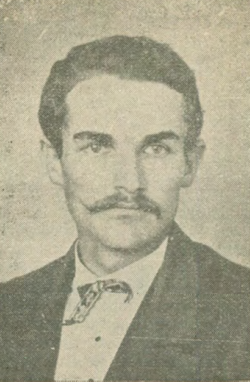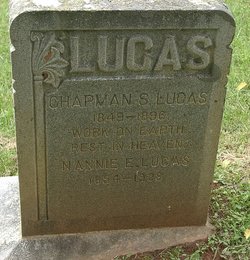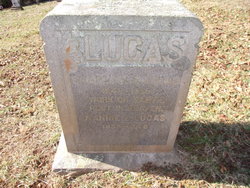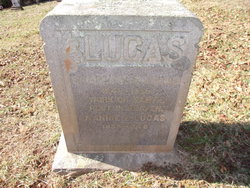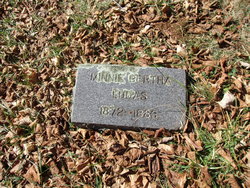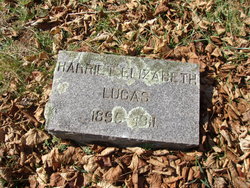| Description |
: |
Suggested edit: Chapman S. Lucas
May 5, 1849—June 20, 1896
By J. W, West
Compiled from the Life of Chapman. S. Lucas by B. A.
Abbott, published in 1897.
It was appropriate for Dr. B. A. Abbott to write the life of Chapman S. Lucas, a great preacher, born and reared in the mountains of Virginia, for they were brothers-in-law.
Chapman S. Lucas was born at Maybrook, Giles County, Va., May 5, 1849. When only thirteen years old, Brother Lucas made the good confession during a meeting held by Dr. Chester A. Bullard and his son, W. S.,and...
Read More
|
Suggested edit: Chapman S. Lucas
May 5, 1849—June 20, 1896
By J. W, West
Compiled from the Life of Chapman. S. Lucas by B. A.
Abbott, published in 1897.
It was appropriate for Dr. B. A. Abbott to write the life of Chapman S. Lucas, a great preacher, born and reared in the mountains of Virginia, for they were brothers-in-law.
Chapman S. Lucas was born at Maybrook, Giles County, Va., May 5, 1849. When only thirteen years old, Brother Lucas made the good confession during a meeting held by Dr. Chester A. Bullard and his son, W. S.,and was baptized August 7, 1862 by that pioneer preacher, J. A. Cowgill. Before "Chap" was fifteen years old, he preached his first sermon in that church where he had made the good confession two years earlier at Sugar Grove.
When he was twelve years old, the Civil War broke out, and his father entered the Southern army. Chapman Lucas, as the oldest child, had to take his father's place at home. Not only did he look after the affairs at home, but also the welfare of two aunts whose husbands were away in the army.
When he expressed a desire to attend college, his father objected to such nonsence. The youth told his mother that unless he could go to college, he would run away from home and they would not hear from him again. The mother intervened and as a result, he entered Richmond College. He joined forces with other poor students who boarded themselves. One of his most serious mistakes in college was his failure to realize that the body needed recreation, but friends could not induce him away from his studies. When he went home for his first vacation, he was so pale and thin that his mother wept over him and opposed his return to college. Work on his father's farm soon brought back his strength, however, and he returned that fall.
After leaving college, he commenced a series of evangelistic meetings, chiefly in the mountains of Southwest Virginia, which added hundreds to the church. Dr. Bullard, whose converts were called " Bullardites ", influenced his life much. The people were so used to death bed stories, sermons so full of the wrath of God, and the Bible's being disregarded and called a "dead letter", that they held sane preaching in contempt, called those who obeyed the gospel, "Bullardites"; while in other sections those who proclaimed the same message were called "Camphellites."
Brother Lucas did not use the methods of the prevailing religious bodies which had degenerated into sensationalism. The prevailing belief was that a Christian's standing was not determined by the scriptures, but by his feelings and experiences.
He traveled through cold and heat, and if no one furnished him a horse to ride, he walked. Once without money, he bartered his pocket comb and hired a boy to ferry him over a river.
In some communities, the basest slanders were circulated about him, including the story that he had served a term in the penitentiary. One day when he was interrupted during a sermon and asked if he had been in the penitentiary, he paus- ed to reply that he had been in the penitentiary and had preached to convicts more orderly than some of the people in his audience. He was allowed to proceed without further interruption. At another of his services held at Price's Fork, Montgomery County, men entered the church and forbade the baptism of some of their members. Sectarianism was violently against anyone who preached the gospel in its fullness. One lady said, "I do not like to hear him preach, his sermons are nothing but a string of scripture."
His success in the mountains of Virginia made him famous, and he was called to minister to the church at Charlottesville, (where Edwin S. Sweeney is now minister). This was his opportunity to study in the University of Virginia, and there he studied Greek, Moral Philosophy, and other studies. Again he neglected his health and suffered the consequences.
He saw great need for building churches and held meetings and donated the money received to the Seventh Street Church in Richmond. He proposed a church building- fund for Virginia which antedates our Church Extention Fund.
While he was State Evangelist, the Virginia Christian Missionary Society was organized. His work as State Evangelist was marked by great zeal, devotion, and ability. During this time he decided upon an effort to build a church in Lynchburg, and to that end he began a meeting in Holcome Hall, September 17, 1875. Here he was soon joined by L. A. Cutler. The meeting was at success and Lucas made Lynchburg his headquarters to give this work his attention. He sacrificed much to found the Lynchburg work, and influenced others to do likewise. One woman who earned seventy-five cents a week, gave twenty five cents of it for the building fund. Another who made her living with her needle, sold her shawl and gave the proceeds to the same fund.
His heart was so set on the work at Lynehburg that he held nothing too dear to sacrifice for it. When breathren gave him money and informed him that part of it was for himself and part for the church, usually he placed nearly all of it in the church fund. A man gave him two loads of coal, one for himself and one for the ehureh. Brother Lucas sold his ton to get money to go to Petersburg and hold a meeting. He preached there until time to go to Richmond to the State meeting and read his report. Finding he had not money enough to go by train, he walked the distance of twenty-two miles to Richmond.
When the time eame to build the Lynehburg ehurch-home, he worked with his own hands, carrying bricks and mortar like the men hired to do the work. Under date March 1877, in The Examines, he says he appealed directly by postal card to more than fifteen hundred brethren for contributions to the building fund. At last, after traveling, preaching and soliciting funds, the happy day for opening the church came. It was May 27, 1877, and the formal opening was followed by another successful meeting in which L. A. Cutler again assisted him. Eighteen months had passed since these two men first preached in Holcombe Hall.
The Virginia Christian Missionary Society paid Brother Lucas $25.00 per month to help support him after the Lynchburg church was opened. In addition to the work in Lynchburg, as State Evan- gelist, he reported September 4, 1877, that he visited and preached 240 times at thirty-six churches, and baptized 91 persons. His plan embraced the establishment of churches in Staunton, Petersburg, and in every important city of the State.
An incident which occured at Wytheville throws full light upon the great heart of this man. On his way to the depot, he met a poor woman with children. All were poorly clad, and without shoes. He took them to a store, spent all his money for clothing them and begged something for them to eat. Then as he went on his way, he pondered whether or not the conductor of the train could be induced to take his watch for transportation until he could redeem it. As luck would have it, a friend came along, and without solicitation, gave him money so that he was relieved of the embarrassment of bartering with the conductor.
On leaving his ministry at Lynchburg, he became minister at the Westville Church, Mathews County. While there he led in building the Holly Grove church, and again worked with his own hands, and in order to begin work with other men, he got up at five a. m. to travel seven miles. While there, he received a call to Lexington, Missouri, and during his three years ministry there he held meetings at Kansas City, Independence, Liberty, Sedalia, Richmond, Carrollton and elsewhere.
He accepted a call to Augusta, Georgia and remained there about six years. Again he led in the movement which resulted in the building of the Second and Third Christian Churches in that city. Under the direction of Mrs. Taubman, he also be-
gan and made possible, the erection of churches at Athens and Savannah.
Such was the opposition to this movement to return to the New Testament pattern of the church, when Brother Lucas settled in Augusta, that he found our ministers had not been invited to join the Ministerial Union. Accordingly when his name was proposed, there was opposition to his election. The Union languished and died. Then he revived it, and led it as its President. The church at Augusta had been wholly ignored at the annual Union Thanksgiving Service. Brother Lucas observed this, and for the next Thanksgiving he went to the merchants and obtained gifts for the poor, had the church beautifully decorated with many useful gifts, and invited the city to attend the services. The service was a great success. Sectarian prejudice begotten by preachers, could not halt a
man like "Chap" Lucas.
During the blizzard of 1885 and the freshet of the following year, he organized an immense relief corps from all the churches, and as general director, aided hundreds of suffering people, and saved many lives. One writes: ' ' He did more for Augusta than all other influences combined in breaking down the walls of prejudice within which the denominations intrenched themselves, and taught the people to study the Bible as the word of God and to govern their lives by that, rather than by creeds and prayerbooks."
The long hot summers impaired his health, and he was forced to return to the mountains of his native state. He took charge of the church at Roanoke, Virginia. Here his feebleness grew, and he removed with his family to the old family home at Maybrook. During the year, however, he held meetings at Louisville, Nicholasville, Midway, Hopkinsville, and Williamsburg, Ky., Baltimore, Md., and at Ronceverte, W. Va. Later he entered upon his ministry at Maysville, Ky., and conducted meetings at Carrollton, Stanford, Paris, Somerset, and Augusta, Ky.
The growth of the restoration movement was very displeasing to the denominational preachers, and led them to challenge representatives of our movement for debates. At Dover, Ky., beginning November 17, 1891, Brother Lucas entered into a joint discussion with J. B. Moody, a Baptist. The debate lasted eight days. He also met the Rev. F. P. Ramsey, a Presbyterian minister, in debate.
On January 1, 1893, he became the minister of the First Christian Church, Alleghany, Pa. His health was so poor that in 1895 the church gave him a four months trip to Palestine. His work in the Keystone State was far reaching in its influence outside of the city of Alleghany now a part of greater Pittsburgh. His motto was "Work on earth; rest in heaven." He almost literally gave his life to the Cause of Christ. It may be truly said of him that "He made God first, his family second, and himself third."
A month before his death, he sent a beautiful and tender pastoral letter to the members of the congregation and urged their devotion to the work of Christ. A schedule of his sermon topics for November reveals that the very evening of his
funeral, his theme was to have been "Gates of Heaven Everywhere," and the topic for the following Lord's Day was to have been ''The Peaceful End of the Good Man."
On Friday, November 20, 1896, Chapman S. Lucas died. When the news flashed through the land that "Chap" Lucas was dead, thousands of hearts were saddened. Funeral services were held in Alleghany and the Pittsburgh Commercial Gazette gave the following account of them: "There was a great demonstration of affection for a beloved man at a funeral in Alleghany yesterday. Women fainted and some violent exhibitions of grief were witnessed. Nearly 5000 people filed by the coffin in which lay the remains of the late Rev. Chapman S. Lucas lay in state in the First Christian Church, Alleghany, yesterday afternoon and looked the last time upon the face of him who had been a pastor and friend. Such a tribute to the worth of a minister of the gospel had never been seen before in that city. At 3 P.M. the body of the late pastor was borne by official members of the congregation into the church where he had twice preached on the preceding Lord's day and placed in the aisle before the pulpit platform. At the conclusion of the funeral services, the friends of the deceased were afforded the opportunity to view the remains. The immense audience present headed a procession which continued to pass by the open coffin until the remains were removed from the church at 8 p. m. and transferred to the limited train of the B. & O. Railroad, to be transported to Maybrook, Va., for interment. A pall of sorrow hung over the crowds which thronged the church, and indeed, over the city where the deceased pastor had lived and labored."
The same daily paper proceeds to relate that long before the hour fixed for the funeral services 1500 people had taken possession of the spacious church at Montgomery Avenue and Arch Street; that to hundreds who stood in the streets a commitee of ministers left the platform and announced that entrance to the church was impossible, but that it would be kept open until 8 P.M. and that all would be admitted before the removal of the remains.
"On the platform were ministers of the Christian Church and other ecclesiastical bodies. The services were in charge of Rev. B. A. Abbott of Baltimore, a brother-in-law of the deceased." The burial took place in the family burying ground in the midst of the scenes of his childhood, among the hills he loved so much. W. S. Bullard, whose message years before had called him to a higher life, conducted the funeral services.
One writes:"Rich and poor, old and young, were at the burial. Many wept as they took a last look at him." A man said: "Can it be possible we have no more Chapman Lucas! How, strange it seems. ' '
Many regarded him as one of the most brilliant preachers Virginia ever produced for the restoration movement. He was a thinker, and drew crowds to hear him for he had a message for them.
West, J. W. Sketches of Our Mountain Pioneers.
Spouse: Nancy "Nannie" Evelyn Carper (1854-1928), married April 16th, 1871, at Craig County, Virginia – five daughters (Minnie, Emma, Bessie, Eva, Harriet)
Father: George Adam Lucas (1826-1874)
Mother: Harriet Elizabeth Adkins (1827-1910)
Occupation: minister/preacher for the Christian Church.
Baptized by: J. A. Cowgill (1862)
Contributor: Ronald C. Brewer
The Evening Bulletin, Maysville, Kentucky
Saturday, November 21, 1896, page 2
Rev C S Lucas died Friday morning at 2 o'clock at his home in Allegheny, Pa, of abcess of the throat. The sad news was received this morning.
Deceased was pastor of the Christian Church, this city, a few years ago, and was one of the ablest men in that denomination.
He leaves a wife and several children.
Funeral Sunday at 3 pm at Allegheny, where he had been pastor of the First Christian Church since he left this city. |

